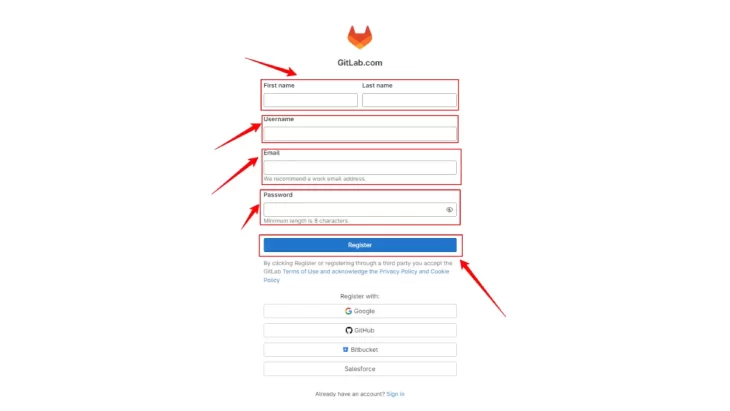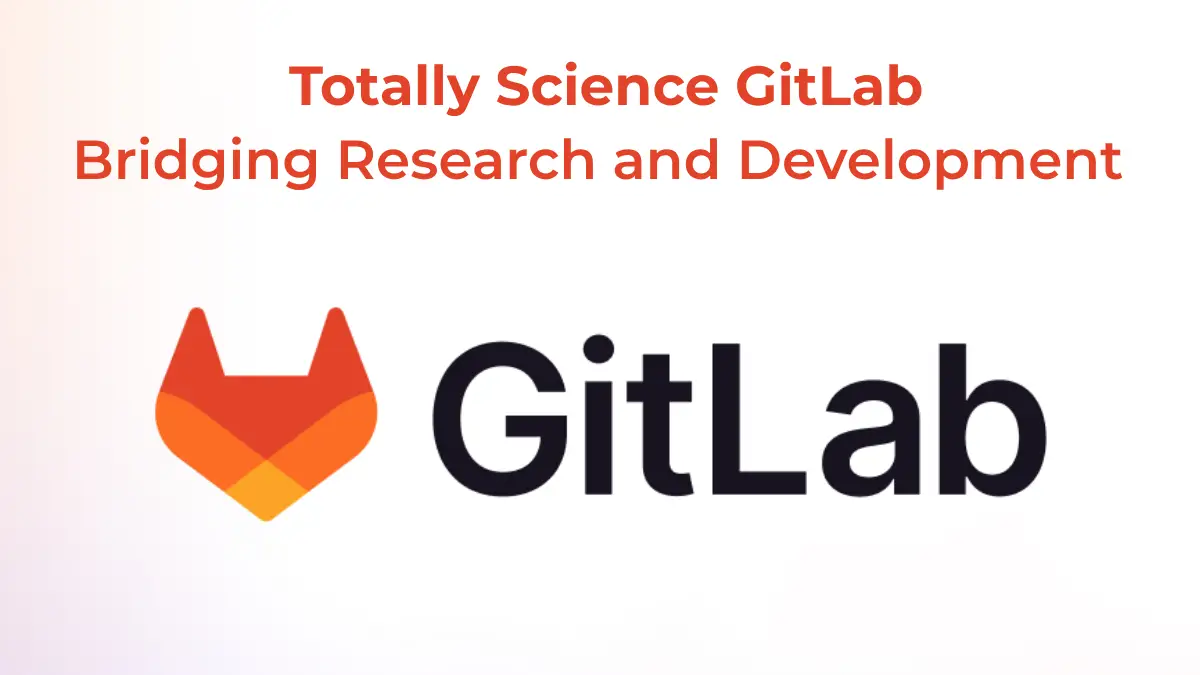The GitLab platform emerges as a pivotal platform for research and development in an era where technology shapes the landscape. It was originally designed for software development but has now become an essential tool in science.
Our goal in this article is to explore GitLab’s importance in scientific endeavors, explore its various applications, and explain the benefits it brings to researchers and data scientists.
The Science of GitLab

Version Control
GitLab’s version control capabilities play a vital role in science, much as they do in software development. Scientists, much like developers, can track changes, collaborate on projects, and ensure data integrity by keeping an organized history of their work.
In scientific research, maintaining accurate records of experiments, observations, and analyses is of paramount importance.
GitLab’s version control not only offers the ability to track changes but also provides a snapshot of the entire history of a project, ensuring that data remains tamper-proof and transparent.
Collaboration
Collaboration is at the heart of modern science. Scientists often work together from different parts of the world, and GitLab provides an ideal platform for this seamless collaboration. It offers features like code review, commenting, and issue tracking, making teamwork more efficient.
Whether it’s a global team of researchers or scientists within the same institution, GitLab brings the advantage of real-time collaboration to scientific projects.
The ability to review and comment on work, suggest improvements, and even pinpoint issues ensures that the collaborative process is streamlined and productive.
Automation
Automation is essential in science to streamline repetitive tasks and ensure efficiency. With GitLab’s built-in automation tools, scientists can create pipelines for data analysis, making their work more efficient and reproducible.
Automation can also help in the management of resources and data, ensuring that repetitive and time-consuming tasks are handled seamlessly.
GitLab’s automation features provide scientists with the luxury of concentrating on the critical aspects of their research or data analysis, enhancing productivity.
Real-Life Applications
Research Projects

In research projects, GitLab is used to manage and version data, papers, and code. It ensures that the project remains organized and helps in tracking the evolution of research projects.
Researchers can maintain a record of the changes made to their work, making it easy to identify the progress made and the contributions of team members.
This also serves the crucial function of establishing data provenance, a fundamental aspect of scientific research.
Data Analysis

Data scientists find GitLab invaluable for managing and versioning data analysis workflows.
This not only allows data scientists to work in a collaborative environment but also ensures that the process of data analysis is systematic, transparent, and replicable.
GitLab becomes the bedrock of ensuring that the findings in data analysis can be consistently reproduced, a cornerstone of the scientific method.
Software Development

Even in software development for scientific applications, GitLab plays a significant role. Its support for agile development, continuous integration, and issue tracking streamlines the development process, allowing for rapid progress.
In the context of scientific software development, maintaining code quality and ensuring that it integrates seamlessly with other components of research is critical.
GitLab provides tools for developers to work in a way that is consistent with modern software development practices, ensuring that the software created for scientific purposes is robust and efficient.
Benefits of Using GitLab in Scientific Work
Data Integrity
GitLab ensures that data remains intact and unaltered. With version control, scientists can always access the complete history of their work, promoting data integrity.
This is particularly critical in research where data accuracy is a fundamental aspect. Any change or modification to data is tracked, providing a secure and tamper-proof record of the research.
Reproducibility
Scientific research requires results to be reproducible. GitLab’s version control allows researchers to share their work with others easily, ensuring that experiments can be replicated.
This aspect of GitLab is pivotal in scientific research, where reproducibility is a cornerstone of establishing the validity of results.
Researchers can confidently present their work, knowing that others can replicate it and validate their findings.
Collaboration Efficiency
The collaboration features in GitLab simplify teamwork in science. Whether working on research projects, data analysis, or software development, GitLab brings efficiency to the collaborative process.
Researchers can work seamlessly, with real-time collaboration ensuring that projects move forward smoothly.
The ability to track and address issues, whether related to data, analysis, or code, ensures that the collaborative process remains efficient and focused.
Getting Started with GitLab
Setting Up an Account

To get started with GitLab, you need to create an account. It’s a straightforward process, and you can choose from various account types, depending on your needs.
Whether you are an individual researcher or part of a larger scientific team, GitLab offers account options tailored to your requirements.
Creating a Repository
Once you have an account, you can create a repository for your project. Repositories are where you’ll store your data, code, and documents. Creating a repository is simple and can be customized according to the requirements of your project. GitLab offers easy repository management tools, ensuring that you can organize your work in a way that best suits your research or development project.
Basic Git Commands
GitLab relies on Git, a powerful version control system. Learning some basic Git commands will be immensely helpful in your scientific work.
Git commands such as ‘commit’, ‘push’, ‘pull’, and ‘branch’ are fundamental and can be quickly grasped.
GitLab offers a user-friendly interface, but understanding these basic commands is advantageous in ensuring that you can efficiently navigate the platform.
GitLab in Research
Managing Research Data
In research, managing data is a crucial task. GitLab’s version control keeps track of changes, ensuring you always have access to previous versions of your data.
In scientific research, maintaining a record of changes to data is pivotal in maintaining the integrity of research.
GitLab’s data management tools provide a secure and transparent environment for managing research data.
Collaborative Projects
Whether you’re working on a solo research project or collaborating with other researchers, GitLab makes project management and collaboration straightforward.
In a collaborative environment, the management of projects can become complex. GitLab simplifies this by providing a collaborative platform where researchers can manage and track the progress of research projects with ease.
Tracking Changes
Tracking changes to your research is vital. GitLab’s version control allows you to see who made what changes, promoting transparency and accountability.
Knowing who made changes and when they were made is essential in maintaining the integrity of research.
This not only ensures accountability but also allows for a clear understanding of the contributions of team members.
GitLab for Data Analysis
Data Pipelines
Automating data analysis pipelines in GitLab allows data scientists to process large datasets efficiently and consistently.
Data analysis often involves repetitive tasks that can be automated. GitLab’s automation capabilities enable data scientists to create pipelines that ensure consistency and efficiency in data analysis, making the process manageable and reproducible.
Code Versioning
Version control for data analysis code is essential for ensuring the reproducibility of results and collaboration with other data scientists.
In data analysis, the versioning of code is pivotal in ensuring that the analysis process is transparent and consistent.
GitLab’s version control tools provide data scientists with a secure and organized environment for managing and tracking their analysis code.
Data Visualization
GitLab can even be used to version data visualization code, making it easier to create and share informative visualizations.
Data visualization is a key aspect of data analysis. GitLab’s version control allows data scientists to manage data visualization code in a way that ensures that visualizations are consistent and reproducible, contributing to the transparency of the data analysis process.
GitLab in Software Development
Agile Development
For software development in science, adopting agile methodologies is becoming more common. GitLab supports agile development with features like boards and milestones.
Agile development is increasingly relevant in scientific software development. GitLab offers tools that enable the use of agile methodologies, ensuring that software development projects are managed efficiently and flexibly.
Continuous Integration
Continuous integration ensures that code is continually tested and integrated into a project. GitLab’s CI/CD pipelines make this process seamless.
Continuous integration is a crucial aspect of software development in science. Ensuring that code is tested and integrated seamlessly is pivotal in maintaining code quality and integrity.
GitLab’s CI/CD pipelines offer a secure and efficient way to ensure continuous integration.
Issue Tracking
Tracking and resolving issues is critical in software development. GitLab’s issue-tracking system is a valuable tool for identifying and addressing problems.
Issue tracking is an essential aspect of software development in science. GitLab provides tools that enable developers to track and resolve issues systematically, ensuring that software projects progress smoothly.
Best Practices
Branching Strategies
Adopting a good branching strategy is essential for managing different aspects of scientific work. GitLab provides various branching models to choose from.
GitLab offers different branching models that can be adapted to the specific requirements of scientific work.
Understanding and implementing an appropriate branching strategy can streamline project management and maintain the integrity of data, code, and analysis.
Documentation
Proper documentation is key in science. GitLab allows you to document your code and projects, making it easier for others to understand and contribute.
Documentation is a fundamental aspect of scientific work. GitLab offers features that allow for the systematic documentation of code, data, and projects.
This ensures that others can understand and contribute to your work, enhancing transparency and collaboration.
Security Considerations
Protecting your scientific work is crucial. GitLab offers security features to ensure that your data and code are safe from unauthorized access.
Security is paramount in scientific research and software development. GitLab provides security features such as access controls, authentication, and encryption to protect your data and code from unauthorized access.
Ensuring that your work is secure is a fundamental aspect of maintaining the integrity of research and development.
Conclusion
GitLab has become an invaluable asset in the realm of science, shaping the way research and development are conducted in the modern era.
Its version control, collaboration, and automation features have found applications in research, data analysis, and software development, enhancing productivity and promoting transparency.
As science continues to evolve, GitLab is poised to play an even more significant role in facilitating groundbreaking discoveries and streamlining scientific workflows.
FAQs
1. Is GitLab suitable for all scientific disciplines?
GitLab is versatile and can be adapted to various scientific domains, making it suitable for a wide range of disciplines. Whether you are in the natural sciences, social sciences, or any other field, GitLab offers tools that can be customized to your specific requirements.
2. How can I learn to use GitLab for scientific work?
GitLab provides extensive documentation and tutorials to help you get started. You can also find many resources online, including video tutorials and community forums where you can seek assistance and guidance.
3. Is GitLab free to use for scientific research?
GitLab offers both free and paid plans. The free plan should be sufficient for many scientific projects, making it accessible to researchers and scientists.
4. Can I collaborate with researchers from different locations using GitLab?
Yes, GitLab allows for collaboration with researchers from around the world, making it a powerful tool for global research projects. Whether you are working with colleagues in different countries or collaborating with international research teams, GitLab’s online platform facilitates seamless collaboration.
5. How does GitLab ensure the security of my scientific data and code?
GitLab provides security features such as access controls, authentication, and encryption to protect your data and code from unauthorized access. It also offers tools for maintaining data integrity and ensuring that your scientific work is safe and secure. GitLab’s commitment to security ensures that your research and development projects are protected.






